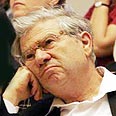
Aharon Barak censured over comments on Arab human rights
Former Supreme Court president's remarks against Israel's policy in West Bank draw heat from senior legal system officials, scholars. 'Barak is a brilliant jurist, but he is biting the hand that feeds him,' one of them says. Yesh Din: Some of his rulings solidified occupation in territories
Senior officials in the legal system have leveled harsh criticism at former Supreme Court President Aharon Barak over his recent comments regarding the "problematic" human rights situation in the "occupied territories."
"Barak has lost it; he's acting as though he's chasing after PR and is unaware of his position" a retired judge told Ynet. "He must understand that he still represents the State of Israel and cannot make remarks that can hurt it."
Other officials criticized Barak's support for "a state for all its citizens", with some saying that the former Supreme Court president's rulings were cornerstones of the Israeli "occupation."
Speaking at a New Israel Fund legal conference at the Rabin Center in Tel Aviv on Thursday, Barak also said, "If you ask a Jew whether he supports equality with the Arabs, he will say: 'Certainly', and if you ask if he supports kicking all the Arabs out of here, he will say: 'Certainly'. He sees no contradiction between the two."
Another legal source said "Barak is a brilliant jurist, but he is (biting the hand that feeds him). We must keep in mind that it was Barak who authorized the construction of settlements and even founded the method of building settlements on State-owned land.
Professor Eliav Shuchtman of the Sha'arei Mishpat law school said Barak's statements "accentuated the need for appointing Supreme Court judges with different political views to create balance.
"You can't expect anyone, particularly a prominent judge, to hide his or her views, but the problems arise when the Supreme Court's rulings are based on a sole opinion," he said.
In response to Barak's remark that "the Arab citizens deserve the same rights that the Jews deserve", Eliav said "if it is so bad here, then why do the Israel-Arabs want to stay? Apparently the human rights situation of the Arab public is not so bad.
"Israel was established as a Jewish state. There are already 22 Arab countries and a host of other Muslim ones – so why turn the Jewish state into a 'state for all its citizens'? This obviously does not coincide with the Zionist vision," he said.
'Situation in territories is difficult'
Professor Amnon Rubinstein, a law scholar and former minister, was not as surprised by Barak's statements.
"Barak's opinions were expressed in the past through some of his rulings,” he told Ynet. "The Israelis want to end the conflict with the Arabs, provided that we'll be able to sustain Israel's Jewish and democratic character; Barak also wants this.
"The fact is that there is a political consensus regarding the 'two states for two peoples' paradigm, but the Palestinians are demanding 'two states for one people', and to this I do not agree."
Rubinstein added, "Like Barak, I too believe that Israeli Arabs are entitled to full and equal rights, but this must be conditioned on leaders and intellectuals in the Arab sector not joining forces to undermine Israel's existence. We must keep in mind that equal rights also come with equal obligations, including army service."
The professor supported Barak's stance on the human rights situation in the West Bank, saying "military occupation, in its essence, denies human rights because it takes away the civilians' right to choose their own political fate. However, I differentiate between human rights infringements that stem from Israel's security concerns and infringements that are not related to any security-related need."
Michael Sfard, legal advisor for the Yesh Din human rights group, said "I would have been happy had Barak, during his tenure as Supreme Court president, issued rulings that would have bolstered human rights in the territories. It must be remembered that some of the rulings issued during his tenure permitted some of the more serious violations of human rights Israel had committed in the occupied territories.
"The general mindset within the Israeli public is that during Aharon Barak's tenure as president, the Supreme Court supported the Palestinians, but this opinion is unfounded. There is a broad consensus among people in the field that the Court's rulings regarding the territories were some of the cornerstones of the Israeli occupation. It is hard to imagine how the occupation would have persevered without the Supreme Court."
Retired Deputy Supreme Court President Mishael Heshin called Barak's statement "harsh", but added that "they came from the bottom of his heart."
"The situation in the territories is difficult and we must reach a compromise (with the Palestinians) – this is what Barak said," according to Heshin.
Aviad Glickman contributed to the report










